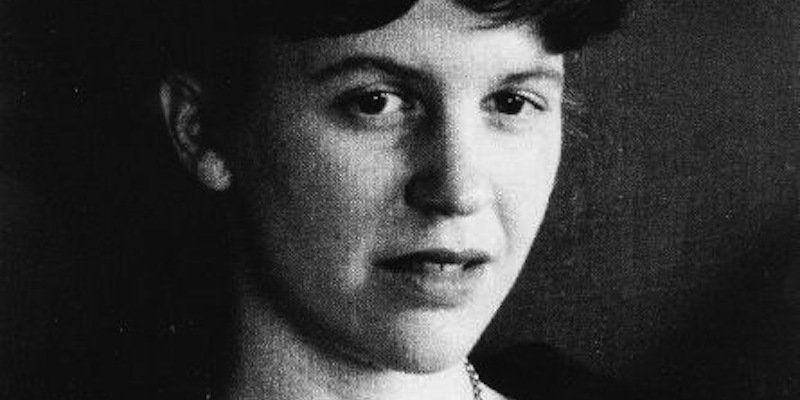On the surface, Random House’s Voice of the Poet series offers something that should be irresistible to any self-respecting lit geek: the opportunity to hear some of the biggest names in 20th-century poetry reading their own greatest hits. In practice, though, it was kind of a mixed bag. For every poet who struck the right notes (T.S. Eliot’s fussy, clinical diction seems oddly appropriate to the state of spiritual desiccation he chronicles in his work), there seemed to be plenty of others whose readings were tonally awkward or just plain boring as shit.
Of all the entries in the series I’ve sampled, however, Sylvia Plath’s is far and away the best. While other poets provided readings, Plath offered an actual performance. The album is made up of recordings from two separate sessions. The first, recorded in 1958, shows Plath to be an adept interpreter of her own work: her lips move like surgical implements through each complicated strain of syllables, carving out stanza after stanza in her even, sonorous voice. It’s the second session, recorded a mere four years later, though, where Plath comes fully alive as a performer (and, according to most, as a poet). Each of the eight selections from her (then still unpublished) collection Ariel is underscored by a maelstrom of suppressed emotion, and the very best among them is “Lady Lazarus.”
I’ve been out of school too long to attempt anything like a close reading of the poem, but by way of brief summary, it deals with a narrator who, wanting to die, finds herself repeatedly dragged back to the land of the living. Plath draws upon common images of rebirth — the resurrection of Lazarus from the Gospel of John, the myth of the phoenix — but recasts them as obscene parodies: a carnival sideshow, a grotesque striptease, a Nazi medical experiment. The doctors who labor to save her life and the friends and family who crowd around her bedside are seen not as caring or benevolent figures, but as diabolical nemeses and vampiric voyeurs feeding and profiting off her pain. The traditional reading of this poem places it fully in the confessional mode, as an expression of the author’s own rage and anguish. It’s a compelling interpretation, given Plath’s tendency to incorporate biographical details into her poems and, of course, in light of Plath’s own tragic death, which looms like a 500 lb gorilla over any discussion of the author’s work. Revisionist scholars, however, attempt to place more distance between Plath and her narrator.
(I would also feel remiss if I did not mention, at least in passing, that Plath’s appropriation of holocaust imagery as a metaphor for personal pain — be it her own or her fictional narrator’s — is narcissistic at best and highly offensive at worst. It’s up to the individual reader to decide whether this is something he or she can see past.)
One of the most remarkable aspects of this very remarkable poem, however, is Plath’s intense awareness of style. Literary scholar Helen Vendler notes that “almost every stanza of ‘Lady Lazarus’ picks up a new possibility” for the poet’s voice. To bring such a work to life, a reader must be able to keep up with each writhing, twisting line as it darts off into unexpected territory. Plath not only navigates the mottled stylistic patchwork of her poem, but also tames it to such a degree that her reading carries a narrative arc all its own. Plath spits out the opening stanzas like a boast, proclaiming the uniqueness of her “gift,” even as she draws comparisons between herself and some of the more horrifying relics of the Nazi death camps. Yet listen carefully around the 30-second mark, where she intones:
Can you deny
The nose, the eye pits, the full set of teeth?
The sour breath
Will vanish in a day.
You can hear the arrogance draining away, replaced with a horror so weary and abject it feels spontaneous. When she warns us that “Soon, soon the flesh/ The grave cave ate will be/ At home on me,” she sounds nearly in tears. The sense of despair is so palpable, you half expect Plath to falter and beg off, but by the time she lights on the next stanza, a hint of playful mockery has crept back into her voice. It’s as though a death shroud has been peeled back from a corpse’s face to reveal a frozen, contemptuous grin.
This tension, this back-and-forth tug between the narrator’s strength and her vulnerability, is what fuels the drama of this particular recording. It’s as though she wants to take back ownership of her life and her condition by feigning a cavalier attitude toward her awful twilight existence. She builds up walls of irony and disdain in an effort to present a powerful and terrible face towards the sadistic doctors and gawping, “peanut-crunching crowds,” but her own hurt, bitterness, and fear keep finding a way through the cracks.
The poem ends with a stern warning, not just to the doctors and the rubbernecks, but to God and the Devil themselves:
Herr God, Herr Lucifer
Beware
Beware.
Out of the ash
I rise with my red hair
And I eat men like air.
These stanzas are the last reversal, the final frames of every revenge fantasy in which the tormented protagonist visits terrible punishment upon those who have done her wrong. Yet there is nothing triumphant in Plath’s delivery, no force behind her blasphemous threat. There is only the infinite fatigue of one who no longer possesses the conviction to lie to herself. How strange and frightening that, in Plath’s own hands, her boldest assertion of personal power comes off sounding like a hopeless capitulation.
